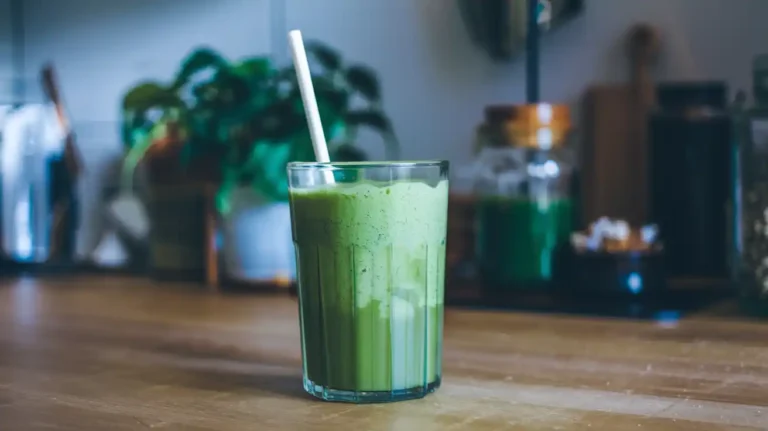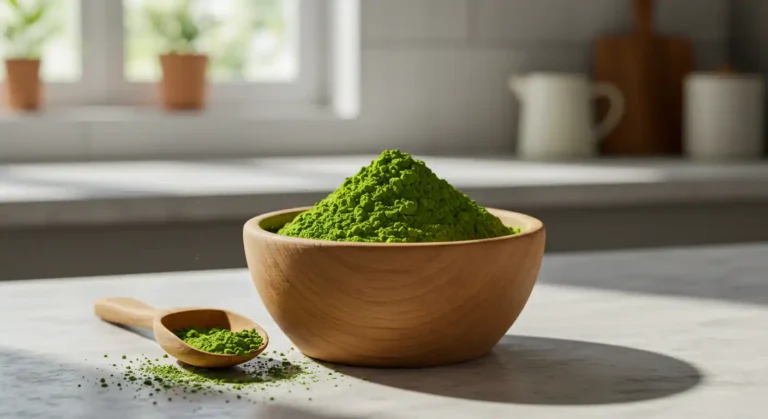Science-Backed Matcha Health Benefits: Why Doctors Recommend This Ancient Tea?
Have you thought about how a simple cup of tea could change your health?
As people who love health and study wellness, we’ve looked at many superfoods, but few have grabbed our attention like matcha.
Matcha, a bright green powder, isn’t just a fad. This Japanese tea has been around for hundreds of years and now gets attention for its amazing matcha health benefits. New research shows that the benefits of drinking matcha include making your mind clearer, helping your immune system, and even boosting your metabolism.
But what’s so special about matcha?
In this article, we’ll take a close look at the science behind matcha tea health benefits and see why more and more health experts say it’s a top-notch natural supplement.
Get set to learn how matcha can become a key part of your wellness plan and help you live a healthier, more aware life.
Disclosure: We partner with companies that offer products to help our readers. If you purchase through our links, we earn a commission at no extra cost to you. For more details, visit our disclosure page.
Matcha Nutritional Value: A Symphony of Wellness

When we talk about drinks, matcha tea is in a class by itself. It’s not just something to sip on – it’s a nutritional wonder made using age-old Japanese methods.
Unlike regular teas, matcha keeps all the goodness of the whole tea leaf, turning it into a strong powder full of nutrients that provide powerful matcha health benefits. Let’s take a closer look at what makes it so special for your body.
Where Does Matcha originate From?
Matcha’s journey starts well before it reaches your cup. The careful growing process gives matcha health benefits its unmatched nutritional density, making it a powerhouse of plant-based nutrition.:
- Shade-Grown for Perfection: Farmers shade tea plants 20-30 days before harvest to boost chlorophyll production and amino acid content.
- Hand-Picked Excellence: Workers select the youngest most tender leaves for matcha, to ensure maximum potency.
- Stone-Ground Precision: Grinders use stones to turn leaves into a fine powder to preserve nutrients and to enhance bioavailability.
This craft-based process turns matcha into a nutritional powerhouse, unlike any steeped drink.
Matcha Nutrients Goldmine
What does matcha green tea do for the body?
Unlike most drinks that deliver fleeting hydration, matcha offers a dense spectrum of micronutrients:
| Micronutrient | Benefits | Unique Traits |
| Chlorophyll | Detoxifies, boosts liver health | Provides matcha’s signature vibrant green color |
| Vitamin C | Strengthens immunity | Highly absorbable |
| Selenium | Protects cells, supports thyroid | Powerful antioxidant |
| Zinc | Regulates metabolism, enhances immune response | Integral for enzyme functions |
Each of these nutrients works synergistically to support your body’s natural processes, making matcha a true superfood.
Chlorophyll does more than give matcha its green color – it helps your body clean itself out. This green stuff:
- Helps your liver work better and get rid of toxins.
- Helps your cells fix themselves and heal.
- Works as a natural way to stop body smells by getting rid of them.
When you drink matcha, it’s like you’re giving your body a gentle clean-up inside, without doing anything extreme, thanks to its numerous matcha health benefits.
Unlocking the Power of Matcha Antioxidants
Matcha stands out because you eat the whole leaf. This means you get almost all of its good stuff, not just the 10-15% you get from tea bags.
Catechins and EGCG: Strong Protectors
The best things about matcha are its catechins, a group of antioxidants. The star of this group is EGCG (Epigallocatechin gallate). This chemical:
- Protects against damage from oxidative stress.
- Helps reduce inflammation.
- Might help stop cancer from starting.
Matcha has way more catechins than regular green tea, which makes it good for your health in the long run.
L-Theanine: Matcha’s Zen Molecule
Unlike caffeine in coffee, which often leads to jitteriness, matcha’s L-Theanine provides a calming, sustained energy boost. It promotes:
- Relaxed alertness, perfect for focus-heavy tasks.
- Stress reduction, balancing the stimulating effects of caffeine.
- Enhanced alpha brain wave activity, associated with creative thinking.
Drinking matcha feels like stepping into a mental flow state—calm yet invigorated, thanks to the unique matcha health benefits that enhance focus and relaxation.
Nutrient Density: Matcha vs. Everything Else
To truly appreciate matcha’s superiority, let’s compare it to other beverages:
| Beverage | Nutrient Absorption | Antioxidant Levels |
| Regular Green Tea | 10-15% | Moderate |
| Coffee | Minimal | Low |
| Matcha Tea | Nearly 100% | Extremely High |
By consuming the entire tea leaf in powdered form, matcha delivers:
- 3x the antioxidants of regular green tea;
- better amino acid retention;
- complete absorption of vitamins and minerals.
Drinking matcha everyday is less about hydration and more about experiencing the matcha health benefits that come from fueling your body with pure, plant-based nutrition. It’s a scientifically supported health booster.
With its unique blend of antioxidants, amino acids, and bioactive compounds, matcha has an effect on manifold aspects of well-being.
What are Matcha Health Benefits?

Immune System Booster: Your Natural Defensive Shield
Think of your immune system as a high-tech defense network, and matcha as the specialized upgrade it’s been waiting for.
Matcha is one of the best herbs for the immune system, thanks to its high concentration of catechins, particularly epigallocatechin gallate (EGCG), which enhances immune function and helps combat infections.
The antioxidants, especially catechins like EGCG, play a pivotal role in:
- Neutralizing harmful free radicals, which can weaken the immune response.
- Reducing oxidative stress, a key factor in chronic illnesses.
- Preventing cellular damage by shielding cells from environmental toxins and pathogens.
These effects are more than theoretical; research has shown that EGCG can enhance the activity of immune cells, making your body more resilient to infections.
So it doesn’t just protect—it fine-tunes your immune system to perform better, unlocking one of the many matcha health benefits that make this tea so remarkable.
Mental Performance: does matcha give you energy?
In a world of distractions and burnout, matcha health benefits offer a balanced and effective approach to enhancing mental performance.
Thanks to L-Theanine, a unique amino acid, matcha achieves what most caffeinated beverages can’t:
- Promoting alpha brain wave activity, associated with calm focus and creativity.
- Reducing anxiety, offering mental clarity without jitters.
- Sustaining energy, balancing caffeine’s stimulant effects for a steady flow of concentration.
L-Theanine doesn’t just smooth out caffeine’s rough edges—it works synergistically to optimize brain function. Imagine feeling as focused as a monk during meditation while tackling your to-do list.
Clinical studies also suggest that matcha health benefits include reducing cortisol levels, helping the brain manage stress more effectively, even under intense pressure.
Metabolic Health: Your Natural Metabolism Catalyst
Matcha is a silent partner in your metabolic health journey. While it’s not a miracle cure, its thermogenic properties and ability to influence fat oxidation are remarkable:
- Boosts metabolic rate by 8-10%, even during rest.
- Enhances fat burning during exercise, making your workouts more effective.
- Improves insulin sensitivity, aiding in blood sugar regulation.
This trifecta makes matcha particularly appealing for those managing weight or blood sugar levels.
The key lies in EGCG, which stimulates thermogenesis—your body’s natural calorie-burning process—and promotes the breakdown of fat stores into usable energy.
With matcha, every sip supports a more efficient metabolism, making it easier to maintain a healthy balance.
Cardiovascular Wellness: Matcha’s Heart-Protective Potential
Your heart works tirelessly, and it deserves matcha as its green guardian. The bioactive compounds in matcha have demonstrated measurable benefits for cardiovascular health:
- Lowering LDL cholesterol, the “bad” cholesterol linked to arterial plaque buildup.
- Regulating blood pressure, reducing strain on the heart.
- Improving endothelial function, which keeps blood vessels flexible and healthy.
These effects translate to tangible outcomes. Regular matcha consumption is associated with a lower risk of heart disease and improved blood flow.
The anti-inflammatory properties of its catechins also reduce oxidative stress in blood vessels, creating a protective barrier against cardiovascular damage.
Whether it’s supporting your immune system, sharpening your focus, revving up your metabolism, or safeguarding your heart, matcha health benefits stand out in ways few other natural remedies can. All it takes is one cup a day to start unlocking its full potential.

Scientific Research and Evidence: The Green Truth Unveiled
Matcha’s reputation as a superfood isn’t based on anecdotal tales—it’s grounded in rigorous scientific research.
Over the years, global studies have examined its unique composition, health benefits, and potential risks, shedding light on why this vibrant green tea deserves its place in both traditional medicine and modern wellness practices.
Clinical Studies Overview: The Data Speaks
Unlike those health fads that pass with time, the benefits of matcha green tea are pegged on decades of serious research. From academia to international health organizations, proof is piling up:
Key Research Highlights
- Harvard Medical School studies on antioxidants further confirm the role of matcha in neutralizing free radicals and reducing oxidative stress.
- Long-term Japanese health studies show lower rates of chronic diseases in regions with high green tea consumption.
- International collaborations in nutritional science reveal the influence of matcha on metabolism, cognitive function, and cellular repair.
Significant Findings
- A lower chronic disease rate, reduced cardiovascular diseases, diabetes, and certain cancers have been linked to the regular intake of matcha.
- Improved Metabolic Health: Matcha improves fat oxidation, insulin sensitivity, and metabolic efficiency.
- Neuroprotective Effects: Matcha can delay cognitive decline and may help in preserving memory and mental clarity during the process of aging, studies indicate.
The epidemiological data from Japan, being one of the cultural homes of matcha, clearly indicates a low prevalence of cardiovascular diseases and a lifespan among its people. That really underlines the position of matcha as a strong dietary ally.
Expert Medical Perspectives: Trusted Voices on Matcha’s Potential
Experts in nutrition and integrative medicine have long praised matcha for its unique blend of traditional wisdom and modern science.
Dr. Elizabeth Chen’s Professional Insight
According to Dr. Elizabeth Chen, an expert in integrative medicine, “Matcha is more than a trend; it’s a proven nutritional powerhouse that seamlessly integrates into holistic health practices.”
Her research supports matcha as an adjuvant in conventional treatments in the fields of:
- Immune system support: Excellent for those seeking natural support in addition to medical care.
- Stress management: Suggested for its action in decreasing cortisol and for mental wellness.
- Functional medicine protocols: Increasingly used to address chronic inflammation and metabolic disorders.
Growing Scientific Acceptance
Matcha is being increasingly recognized as a healthy part of functional and holistic medicine, for practitioners recommend it for the following reasons:
- High antioxidant capacity.
- Gentle and efficient caffeine stimulation.
- Role in supporting long-term health goals.
Potential Matcha Tea Side Effects: A Realistic Approach
While you can enjoy many matcha health benefits, it is not without considerations. Like any powerful food or drink, moderation and awareness are important to maximize its advantages while minimizing potential risks.
Caffeine in Matcha green tea
Does Matcha have caffeine in it? Yes, matcha contains roughly 70mg of caffeine per cup, less than coffee but still enough to give it a good kick. Due to L-Theanine, however, matcha tea caffeine content becomes balanced, offering a smooth release of energy without any jitters.
However, this:
- Those sensitive to caffeine should begin with smaller servings.
- If pregnant or nursing, consult a health professional before continued use.
Individual Differences
While matcha is generally safe, some factors require attention:
- Medication Interactions: Matcha may interact with blood thinners or certain medications for blood pressure.
- Caffeine Sensitivity: Moderate levels of caffeine can interfere with sleep for some individuals or cause discomfort.
The recommended limit is 1-2 cups per day so you can benefit from it without excessive caffeine or tannins intake.
Conclusion
As we explored the wonderful landscape of matcha health benefits that it can provide, one thing is clear: this is not just a drink but an extraordinary wellness tool that simply needs to be adopted as part of your daily regimen.
From immune system support to cognitive performance enhancement, matcha is that incredible confluence of traditional wisdom and modern scientific validation.
For those seeking to optimize health, matcha is a scientifically supported, delicious route toward holistic well-being. We encourage everyone to do a thoughtful journey into the world of matcha—through experimentation with quality sources, being aware of their personal health goals, and listening to their body.
Remember, wellness is not about perfection; it’s about making informed, intentional choices that gradually transform your health.
If you’re curious to dive deeper into everything matcha, check out our complete guide to green tea matcha for all the must-know info, tips, benefits, products!
The information provided on this site is for informational purposes only and should not be considered medical advice. Always consult with a qualified healthcare professional before making any changes to your health regimen or treatment plan. For more information, please refer to our full disclaimer page.







